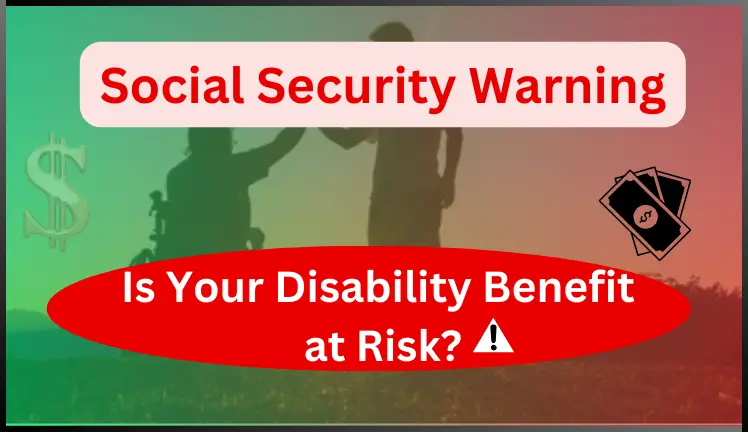Social Security Warning: Recent updates from the Social Security Administration (SSA) have triggered urgent warnings for recipients of Social Security Disability Insurance (SSDI) and Supplemental Security Income (SSI). Understanding these warnings and potential impacts is vital for safeguarding your benefits.

Who Could Lose Disability Benefits?
Recipients of SSDI and SSI are at risk of losing benefits for the following reasons:
- Medical Improvement: Significant health recovery identified during periodic Continuing Disability Reviews (CDRs).
- Exceeding Income Thresholds: Earning more than $1,550/month ($2,590/month for blind individuals) for SSDI recipients.
- Asset and Income Limits (SSI): Assets exceeding $2,000 for individuals or $3,000 for couples, and monthly income above $943.
- Engaging in Substantial Gainful Activity (SGA): Returning to work and surpassing allowable earnings.
- Failure to Comply with SSA Requirements: Ignoring requests for documentation or missing SSA deadlines.
- Incarceration: Disability benefits could be suspended or terminated if incarcerated beyond specified periods.
- Reaching Retirement Age: SSDI benefits automatically convert to retirement benefits.
Read Also:
America Tax Time Guide 2025: Everything You Need to Know for Your 2024 Tax Return
Detailed Reasons You Might Lose Your Disability Benefits:
1. Improved Medical Condition
The SSA conducts Continuing Disability Reviews regularly. Improvement in your medical condition may disqualify you from receiving further benefits.
Tip: Maintain current and detailed medical records.
2. Earnings Exceeding Thresholds
In 2024, earning above the SGA limit ($1,550/month or $2,590/month if blind) could result in benefit suspension.
Solution: Utilize SSA’s Trial Work Period (TWP) to safely explore work options.
3. SSI Income and Asset Limits
SSI beneficiaries must meet strict criteria:
- Monthly Income: Not exceeding $943
- Assets: Maximum $2,000 (individual) or $3,000 (couples)
Tip: Seek financial advice to manage sudden income or inheritances.
Read Also:
$1025 CPP Payment Confirmed for February 2025: Who’s Eligible and How to Apply
4. Non-Cooperation with SSA
Ignoring SSA requests or deadlines can trigger benefit suspension or termination.
Solution: Keep track of all SSA communications and respond promptly.
Actions to Protect Your Benefits:
- Carefully Review SSA Notices: Understand why your benefits are reviewed or terminated.
- Appeal Quickly: File an appeal within 10 days to continue benefits during the review.
- Seek Professional Help: Legal or expert guidance can significantly aid your appeal.
- Stay Organized: Maintain organized records of medical, income, and SSA interactions.
Additional Recommendations:
- Keep SSA updated about changes in health, income, or employment.
- Monitor benefits regularly to avoid overpayments.
- Use SSA’s Ticket to Work program to explore employment safely.
FAQs of Urgent Social Security Warning
Q1: How frequently does SSA review disability cases?
- Medical Improvement Expected (MIE): every 6-18 months
- Medical Improvement Possible (MIP): every 3 years
- Medical Improvement Not Expected (MINE): every 7 years
Q2: Can beneficiaries work while on SSDI or SSI? Yes, within the SSA’s income guidelines and with programs like Ticket to Work.
Q3: What if Social Security overpays me? The SSA typically requests repayment. However, you can appeal or request a waiver if repayment would cause hardship.
Q4: Is receiving both SSDI and SSI possible? Yes, individuals meeting eligibility criteria for both programs can receive concurrent benefits.
Q5: What to do if a CDR deadline is missed? Contact SSA immediately to explain and request an extension to prevent suspension of benefits.
Being proactive and informed is key to protecting your Social Security disability benefits and financial security.
For More Visit SSA official Website
As a finance news writer at sirfal.com, I specialize in breaking down complex economic trends, market updates, and investment strategies into clear, actionable insights. My mission is to empower readers with the knowledge needed to make informed financial decisions. Thank you for engaging with my articles; I hope they add value to your financial journey.